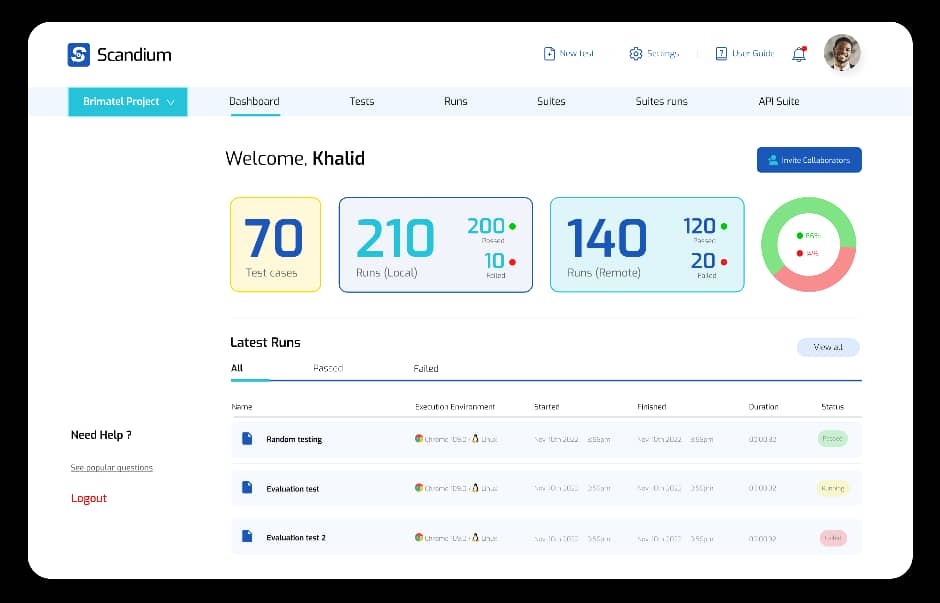
Delivering a functional product that the end users will accept is the aim of every product developer. Software developers must test every product they have designed for functionality to ensure that their products meet every requirement to qualify for it to be successful. Employing test automation tools is a way to go.
Many product owners use manual testing to test for the functionality of their new products. They hire manual testers and wait for them to interact with the new product. However, this method can be capital and time-consuming. A better option will save a lot.
A better way through which software developers carry out software testing is by running tests using software test automation tools. This method is more efficient, saves time, and is less costly when compared to running every aspect of software testing manually.
This article will highlight the top five software test automation tools you can use as a software developer to do your functional, API, regression, and every other software testing your product requires to meet global standards.
What is software testing?
Software testing is the process of evaluating a software product or application to see if it does what it is designed to do. Software testing, also known as product testing, helps improve performance, preventing bugs and reducing the cost of developing your product, such as web applications.
There are different types of software testing, each with its own objectives. All will work together to ensure the product meets the developer’s expectations and the user’s acceptance. The types of software testing include;
- Acceptance testing: This testing determines if the whole system works as intended.
- Integration or API testing: This testing determines if the software components and functions of the system are all working.
- Performance testing: This testing involves measuring the ability of the system to handle workloads.
- Unit testing: Unit testing ensures that each software unit works. The testing coverage involves the most minor units of the system.
- Regression testing: This testing determines if the system still works perfectly after a new feature is added to the software development.
- Usability testing: This testing involves validating how well an end-user can use the system or product and its features to complete tasks it is designed to do.
- Functional testing: This testing involves checking all system functions by emulating business scenarios based on operational requirements.
- Stress testing: This testing involves measuring how much strain a system will go through before it fails.
What is a software test automation tool?
By now, we should know the importance of testing in a product’s life cycle. How else do we perform quality assurance on products we are ready to roll out? However, some automated tools exist that make testing easy for software developers. We have code-based software testing tools, no-code software testing tools, and hybrid (code and no-code).
Test automation tools help teams and organisations automate their software testing needs, reducing the need for human intervention and thus achieving incredible speed, reliability, and efficiency.
There are a lot of these tools in existence. However, we curated a list of the top five software testing tools in 2023.
Top 5 software test automation tools for software developers and product owners
In no particular order of ranking, here are the five best tools you can take advantage of for your automated software testing.
1. Scandium:
Scandium is a no-code test automation tool that doesn’t require the user to know any programming language before they can carry out tests on their software products. With Scandium, you can create and maintain automated test cases and keep records of test scenarios.
Scandium, the no-code test automation tool, is easy to use. Whether you are a QA expert, Software Developer or Manual Tester seeking to make your testing process more efficient with automation, Scandium will work for you. Product owners, product managers, business analysts and other key stakeholders can easily use the tool for testing.
2.Selenium:
Selenium is arguably the most popular automation software tester among web developers and product testers. It has been in existence since 2004 and has evolved with time.
Selenium is compatible with many popular web browsers and allows users to write tests in several popular programming languages, including JavaScript, Java, Ruby, Python, PHP, and C#.
3. Appium:
Appium is an open-source automation tool (hosted publicly on GitHub) for running test scripts and testing native applications, mobile-web applications and hybrid applications on Android or iOS using a web driver. Appium allows testers to write tests in their favourite programming language and tools they are familiar with.
4. Katalon:
Katalon Studio is a test automation solution built on the framework of Selenium and Appium. Non-programmers can use the Katalon tool to generate test scripts, while programmers with Groove, Java, or Javascript knowledge can explore more advanced Katalon Studio features.
5. Cucumber:
Cucumber employs Behavior-Driven Development (BDD) technology to help testers get the most out of software testing. The technology implements essential acceptance test scenarios while development progresses for better results.
Conclusion
Delivering quality products to end-users should be the aim of every product owner, which is why every developer or product owner must do continuous testing on their software products. In recent times, testing can be done easily using test automation tools like Scandium, Selenium, Appium, and Katalon, which makes test executions faster and more efficient compared to manual testing. Test automation tools like Scandium allow users to perform no code testing on their products. That is, one does not necessarily have to be a programmer before they can run tests on their products.
